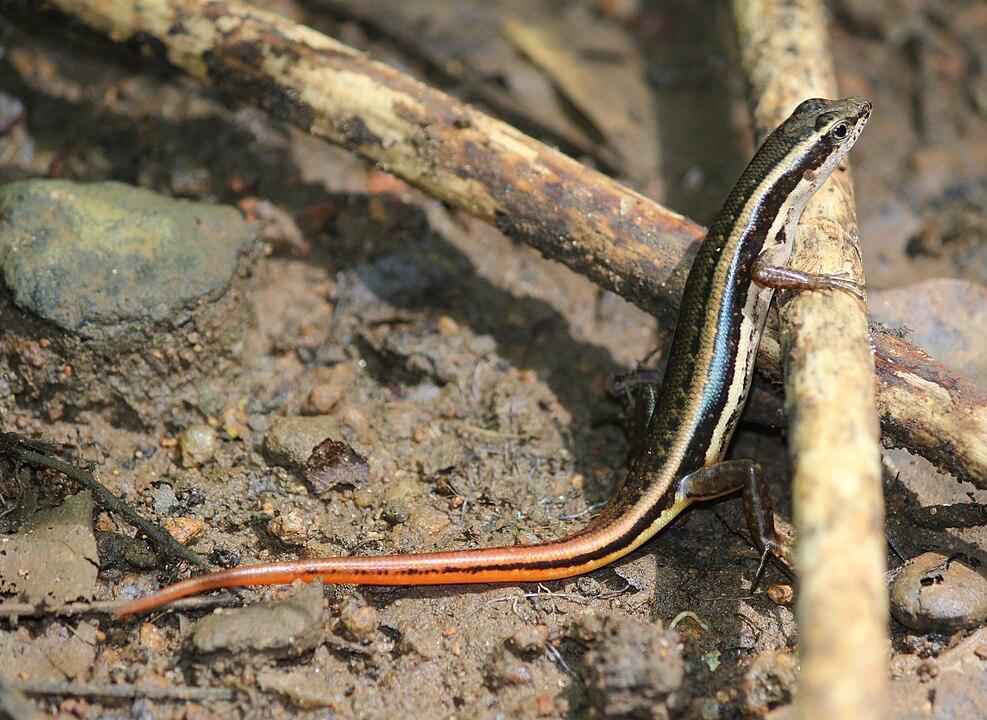
Study Shows Kerala Skink’s Origin: Ocean-Hitchhiking Ancestors Shed Light on Isolated Presence in Peninsular India
For decades, scientists have been fascinated by the Kerala skink, a tiny, unassuming reptile that calls the southern Indian state of Kerala home. But despite its humble appearance, this little creature has been the subject of intense speculation and research, thanks to its peculiar isolation from its distant cousins in Southeast Asia.
Recently, a team of researchers has made a groundbreaking discovery that sheds light on the Kerala skink’s incredible origin story. According to a new study, the ancestors of the Kerala skink did not walk across the ocean from Southeast Asia, as previously thought. Instead, they made a remarkable transoceanic journey, hitching a ride on ocean currents and rafting across the sea when sea levels were lower, 21 million years ago.
The research, published in the journal Current Biology, confirms the long-standing puzzle of the Kerala skink’s isolated presence in peninsular India. By analyzing genetic data, the team of scientists was able to trace the epic journey of these tiny skink ancestors, revealing a previously unknown chapter in the history of this remarkable species.
The Kerala Skink: A Mysterious Isolation
The Kerala skink (Sphenomorphus keralensis) is a member of the skink family, a diverse group of lizards found in tropical and subtropical regions around the world. However, the Kerala skink is unique in its isolation from its closest relatives in Southeast Asia. While its cousins can be found in countries such as Indonesia, Malaysia, and Thailand, the Kerala skink is confined to the southwestern state of Kerala in India.
For years, scientists have been puzzled by this isolation, with theories ranging from the skink’s ancestors being swept across the ocean on debris or sea ice to the possibility of a land bridge connecting India and Southeast Asia in the distant past. However, these theories have been met with skepticism, and the mystery of the Kerala skink’s origin has remained unsolved.
The Ocean-Hitchhiking Ancestors
The new study, led by Dr. S.D. Biju, a renowned herpetologist from the University of Delhi, provides a fascinating solution to this long-standing puzzle. By analyzing genetic data from the Kerala skink and its closest relatives in Southeast Asia, the researchers were able to reconstruct the species’ evolutionary history.
Their findings suggest that the ancestors of the Kerala skink made a remarkable journey across the ocean, riding on ocean currents and rafting on debris or vegetation when sea levels were lower, 21 million years ago. This transoceanic jump allowed the skink ancestors to colonize the southern tip of India, where they evolved into the distinct species we know today.
Genetic Analysis Confirms the Journey
To confirm their findings, the researchers used a combination of genetic and biogeographic techniques. They analyzed DNA sequences from the Kerala skink and its closest relatives, as well as fossil records and geological data.
Their genetic analysis revealed that the Kerala skink shares a common ancestor with Southeast Asian skinks that lived around 21 million years ago. This ancestor is thought to have been swept away by ocean currents, making its way across the sea to the southern tip of India.
The researchers also used biogeographic techniques to reconstruct the skink’s evolutionary history. They found that the Kerala skink’s unique characteristics, such as its distinctive skull shape and coloration, are likely adaptations to its isolated environment.
Implications for Our Understanding of Evolution
The discovery of the Kerala skink’s ocean-hitchhiking ancestors has significant implications for our understanding of evolution and biogeography. It highlights the incredible resilience and adaptability of species, even in the face of seemingly insurmountable barriers.
The study also underscores the importance of genetic analysis in tracing the evolutionary histories of organisms. By combining genetic data with biogeographic and geological information, scientists can reconstruct the complex stories of species migration and colonization.
Conclusion
The discovery of the Kerala skink’s origin is a testament to the incredible journeys that species have undertaken to colonize new territories. This small, unassuming reptile has captured the imagination of scientists and the public alike, revealing a previously unknown chapter in the history of life on Earth.
As we continue to unravel the mysteries of the natural world, we are reminded of the awe-inspiring complexity and diversity of life on our planet. The Kerala skink’s ocean-hitchhiking ancestors are a powerful reminder of the incredible journeys that species have undertaken to adapt, survive, and thrive in a constantly changing world.
Source:
https://researchmatters.in/news/ocean-hitchhikers-tracing-epic-journey-tiny-skink






